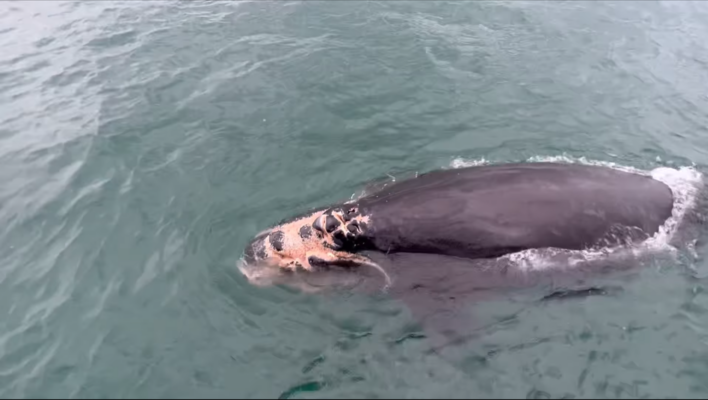

By Lauri deGaris
On April 11, 2024 the Amelia Island Whale Ambassadors threw a whale of baby shower at the Florida House Inn. Dozens of right whale supporters came to offer support and celebrate the mom and calves born this season.
The 2023-2024 right whale caving season can be summed up as rollercoaster ride. It began on November 15, 2023 and will end April 15, 2024. This season a total of 69 individual right whales were spotted in the calving grounds between North Carolina and Florida. And, a total of 19 calves were born, which is the highest number of calves born in one season in the past 10 years.
The 2024 season saw one calf die and three others are not expected to survive. In addition, one yearling was found deceased. And, just last week adult right whale #1950 was reported deceased off the coast of Virginia. Her calf is not expected to survive and will be added the death count once confirmed. Approximately 356 right whales remain along the coast of North America. Vessel strikes and entanglements continue to be top threats to these highly endangered mammals.
Juno #1612 gave us joy when she produced the first calf of the season in November, 2023. On January 3, 2024 the same calf was observed with severe injuries to the head, evidence of a vessel strike off the coast of South Carolina. On March 3, 2024, the carcass of Juno’s calf washed ashore on Cumberland Island.
Pilgram #4340 had a yearling who was spotted January 22, 2024 off North Carolina. By February 3, it was spotted off Melbourne Beach. On March 13, this young right whale was found floating, deceased off Tybee Island, Georgia. And, Skittle #3260 was observed without her calf on March 21.
The majority of the right whale sightings this season occurred between South Carolina and North Florida. Only a handful of right whales were observed south of St. Augustine, Florida. Researchers at the Marineland Right Whale Project suggested a northward shift in the distribution of right whales during calving season. This could be normal variability or perhaps a sign of things to come. Only time will tell. In the past couple of years, a dramatic shift in North Atlantic right whale habitat has been well documented. North Atlantic right whales abruptly moved north to the Gulf of St. Lawrence from the Bay of Fundy. Researchers are curious if a northerly shift could also occur within the known calving grounds.
Off Amelia Island on January 20, 2024, Halo and her calf were spotted from American Beach. Many Amelia Island residents gathered to watch Halo and her new born calf in the surf. For several hours we were treated to a loving display of bonding and apricity. Mother and calf basking in the sun on a cold winter day.
At the right whale baby shower, enthusiasts were joined by members of the Florida Fish and Wildlife Commission Marine Mammal Research Team. Also, representatives from the International Fund for Animal Welfare attended.
The right whale shower theme “baby building blocks” symbolized the building of relationships necessary to rebuild the North Atlantic right whale population. According to Debra Strobel and the Amelia Island Whale Ambassadors, “Individuals and groups need to listen to one another and speak solutions in order to problem-solve through tough dilemmas. We are all building blocks – fishermen, community friends, politicians, boaters, government agencies, and passionate whale lovers. We must be strong and never give up! Together, we can do this!”
James Hain, researcher with the Marineland Right Whale Project had two very poignant remarks in his report concerning the 2023-2024 season. He wrote, “Our collective efforts are aimed at the co-existence of whales and humans.” And, “While we study whale behavior, we recognize that it isn’t whale behavior that we can change. Instead, we wish to apply what we’ve learned about whales, so as to encourage changes in human behavior – leading us back to successful co-existence.”
Godspeed mother right whales and baby calves. We wish you all the best in the years to come. And, we hope to lead ourselves back to a successful co-existence in the world with all our relations above and below the waves.

Thank you, Laurie DeGaris for an excellent article!
safe travels, baby Whales!
Thank you Laurie DeGaris. Bless all of these nearly extinct whales. As Richard Timm has said…..if these whales are extinct, the krill on which they feed will deplete the populations of phytoplankton and algae on which they feed, causing an imbalance in the marine ecosystem. They keep the ocean healthy.